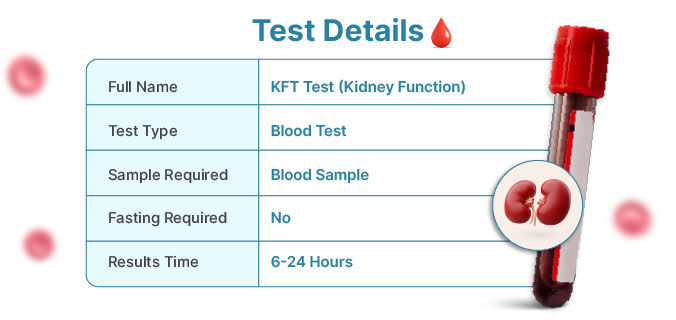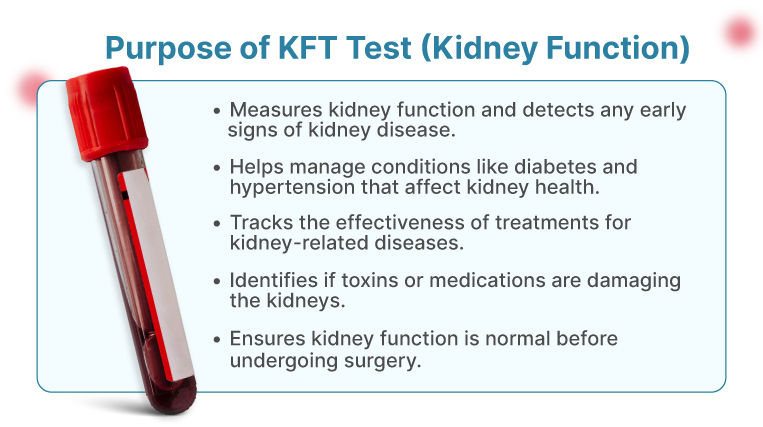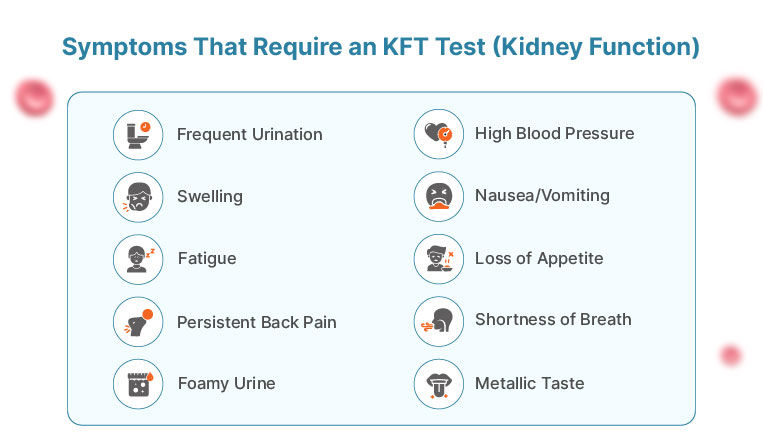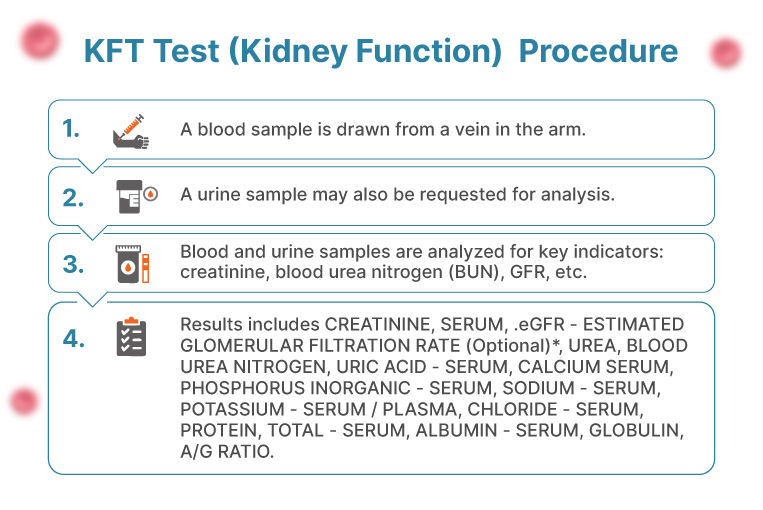KFT with Electrolytes (Kidney Funtion)
 Tests Included (14)
Tests Included (14)
- KFT with Electrolytes (Kidney Funtion)
14 tests included
About

BLOOD

Both

7 years & above
Renal Profile/Renal Function Test/Kidney Function Test - Price, Purpose, Range & Reports
Test Overview
| Sample Type | Blood |
| Reports Delivery | Earliest reports available within 10 hours |
| Price/Cost | 1029 |
| Number of Tests Included | 14 |

What is a Renal Profile/Renal Function Test (RFT) or Kidney Function Test (KFT)?
A renal profile, also known as a renal function test (RFT), kidney function test (KFT), or KFT blood test, is a broad term used to refer to a range of tests that assess the performance and health of your kidneys. A kidney renal function test measures various blood components, including calcium, uric acid, creatinine, blood urea nitrogen (BUN), and electrolytes like sodium, potassium, and chloride. The kidney function test purpose is to evaluate how well your kidneys are eliminating waste and maintaining the proper balance of fluids and electrolytes in the body.
Undergoing RFT or KFT test becomes crucial when there are indications of kidney disorders, such as acute renal failure, chronic kidney disease, and glomerulonephritis. It may also help doctors monitor kidney health in individuals with conditions like diabetes, high blood pressure, and heart disease. Doctors usually order this kidney profile test when patients show symptoms like changes in urine output, swelling in the body, muscle cramps, nausea or unexplained weight fluctuations. The results from a kidney renal function test not only assist in diagnosing potential kidney issues but also provide valuable information to guide treatment decisions. Some KFT test synonyms include Renal Profile, Renal Function Test (RFT test full form), Kidney Function Test (KFT test full form), and Kidney Profile Blood Test. These terms are often used interchangeably to describe tests that evaluate kidney health.
What is the Renal Function Test Price?
Renal Function Test Price in Different Cities
| City | Renal Function Test Price |
| Bangalore | ₹1028 |
| Hyderabad | ₹1125 |
| Chennai | ₹1187 |
| Gurgaon | ₹1025 |
| Delhi | ₹1085 |
Understanding the KFT test price is essential, if you wish to make informed decisions and manage your healthcare expenses effectively. The RFT test price can vary significantly, depending on several factors including:
1. Test Demand: The KFT test cost might fluctuate across different cities in India, owing to the variance in operational costs, local demand, and market competition. For instance, in cities like Hyderabad, Bangalore, Gurgaon, Noida, and Chennai, where demand for the renal function test may be higher, you might find slightly elevated costs. You can also check RFT test price near me for a comparative overview of prices across these cities.
2. Included Services: The KFT test cost typically encompasses various components, such as laboratory charges, fees for sample collection at your doorstep, and any associated professional fees. It's crucial to understand what's covered under the quoted RFT test price to ensure transparency and avoid any unexpected expenses.
3. Laboratory Standards: The standards and reputation of the laboratory can influence the kidney function test or KFT test cost. Premium labs with cutting-edge equipment and stringent quality measures may quote a higher KFT test price for their services. Prioritise choosing a certified lab recognised for its precision and reliability.
4. Discounts and Promotions: Many healthcare facilities provide discounts, promotions, or bundled packages for diagnostic tests like the kidney profile test, including information about the renal function test normal range. These offerings can significantly ease the overall expenditure. Look out for any available discounts or deals when scheduling your examination.
Apollo 24|7’s kidney function test price is extremely competitive and offers complete value for money. Before proceeding with a KFT test, you should check the lipid profile test price across cities. You can easily find an 'RFT test near me' or 'KFT test near me' online if you wish to proceed with this crucial diagnostic procedure.
What is the Purpose of the Renal Function Test?

Understanding the significance of a renal function test is essential for ensuring kidney health and addressing potential renal disorders. Here's why the KFT test is crucial:
- Assessing Kidney Function: The kidney renal function test measures various parameters, such as glomerular filtration rate (GFR), creatinine clearance, and blood urea nitrogen (BUN), to assess how effectively the kidneys are filtering waste products from the blood.
- Detecting Kidney Disorders: The kidney profile test helps in detecting various kidney disorders, such as chronic kidney disease, acute kidney injury, kidney stones, urinary tract infections, and other conditions that may affect kidney function.
- Monitoring Kidney Health: The kidney function test is useful for monitoring the progression of diagnosed kidney diseases and evaluating the effectiveness of existing treatment. They can also help in assessing the overall health of the kidneys in individuals with certain risk factors, such as diabetes, hypertension, or a family history of kidney disease.
- Evaluating Electrolyte Balance: Renal test kidney function evaluations are crucial for assessing electrolyte levels and identifying any imbalances that may arise from abnormalities in renal function. These evaluations play a crucial role in maintaining the balance of electrolytes such as sodium, potassium, and chloride within the body.
- Assessing Acid-Base Balance: The kidneys also help in regulating the body's acid-base balance by excreting acids and bases in the urine. Renal function tests can provide information about the body's acid-base status and help in diagnosing conditions such as metabolic acidosis or alkalosis.
Who Should Get a Renal Function Test Done?

Understanding who should undergo a renal function test procedure is pivotal for proactive kidney health management. Here are some groups of individuals who should consider getting this test done:
- Individuals with Diabetes or High Blood Pressure: Diabetes and high blood pressure are leading causes of kidney disease. Getting a renal function test regularly is crucial for individuals with these conditions in order to monitor kidney health and detect any signs of kidney dysfunction early.
- Those with a Family History of Kidney Disease: If you have a family history of kidney disease or kidney-related disorders, you may be at a higher risk of developing similar conditions. Undergoing a renal function test procedure can help assess your kidney function and detect any abnormalities promptly.
- People Taking Medications Known to Affect Kidney Function: Certain medications, such as non-steroidal anti-inflammatory drugs (NSAIDs), antibiotics, and some blood pressure medications, can impact kidney function. If you are taking these medications, getting a regular kidney function test can help ensure that your kidneys are functioning optimally.
- Individuals with Symptoms of Kidney Dysfunction: Symptoms such as changes in urinary habits, swelling in the legs or ankles, fatigue, or persistent high blood pressure may indicate underlying kidney problems. If you experience any of these symptoms, it's advisable to undergo a KFT test to evaluate your kidney health.
- Those with Autoimmune Diseases or Chronic Conditions: Autoimmune diseases like lupus and chronic conditions such as HIV/AIDS or hepatitis can affect kidney function. A regular kidney profile test is essential for individuals with these conditions to monitor their kidney health and detect any complications early.
In some cases, doctors recommend a combined LFT RFT test to assess both liver and kidney function together, especially in patients with systemic conditions affecting multiple organs.
Components of a Renal Function Test
Understanding the components of a renal function test offers insight into various aspects of kidney health. Here are some tests usually included in the KFT test list:
- Creatinine, Serum: As a component of renal test kidney function evaluation, this facet measures the blood creatinine level, a waste substance produced through muscle metabolism.
- Urea: This test evaluates the amount of urea nitrogen in your blood, which reflects your kidney function and protein intake.
- Blood Urea Nitrogen: This component assesses the amount of urea nitrogen in your blood, providing insights into your kidney function and hydration status.
- Uric Acid-Serum: This kidney function test measures the level of uric acid in your blood, which may indicate kidney function and gout.
- Calcium, Serum: This test evaluates the calcium levels in your blood, which are crucial for various bodily functions, including muscle and nerve function.
- Phosphorus, Inorganic-Serum: This part assesses the inorganic phosphorus levels in your blood, which are important for bone health and energy metabolism.
- Sodium-Serum: The test measures the sodium levels in your blood, which are essential for maintaining fluid balance and nerve function.
- Potassium-Serum/Plasma: The purpose of this test is to evaluate potassium levels in your blood, which are crucial for muscle function and heart health.
- Chloride-Serum: It assesses chloride levels, which is important for maintaining proper fluid balance and acidity in the body.
- Protein, Total-Serum: A key element that measures total protein levels, indicating nutritional status and liver function.
- Albumin-Serum: It evaluates albumin levels in the blood, which are crucial for maintaining oncotic pressure and transporting substances in your body.
- Globulin: This component assesses globulin levels, which play a role in immunity and substance transportation in the body.
- A/G Ratio: This calculates the ratio of albumin to globulin in your blood, offering insights into liver and kidney function as well as immune status.
Understanding the Renal Function Test Report
Understanding your KFT test report is vital to know the status of your kidney health. It provides valuable insights into whether your kidney function falls within the renal function test normal range. Below are the desirable, borderline, and high ranges of the parameters measured by the renal function test:
| Type of Renal Function Test | Desirable Range | Borderline | High |
| Creatinine, Serum | 0.6–1.2 mg/dL | 1.3–1.5 mg/dL | >1.5 mg/dL |
| Urea | 7–20 mg/dL | 21–40 mg/dL | >40 mg/dL |
| Blood Urea Nitrogen | 8–20 mg/dL | 21–30 mg/dL | >30 mg/dL |
| Uric Acid-Serum | 2.5 - 7.5 mg/dL | 7.6–10 mg/dL | >10 mg/dL |
| Calcium, Serum | 8.5–10.5 mg/dL | <8.5 mg/dL | >10.5 mg/dL |
| Phosphorus, Inorganic-Serum | 2.5 - 4.5 mg/dL | <2.5 mg/dL | >4.5 mg/dL |
| Sodium-Serum | 135–145 mmol/L | <135 mmol/L | >145 mmol/L |
| Potassium: Serum/Plasma | 3.5–5.0 mmol/L | <3.5 mmol/L | >5.0 mmol/L |
| Chloride-Serum | 98–106 mmol/L | <98 mmol/L | >106 mmol/L |
| Protein, Total-Serum | 6 to 8 g/dL | <6 g/dL | >8 g/dL |
| Albumin-Serum | 3.5–5.0 g/dL | <3.5 g/dL | >5.0 g/dL |
| Globulin | 2.0–3.5 g/dL | <2.0 g/dL | >3.5 g/dL |
| A/G Ratio | >1.0 | 0.8 - 1.0 | <0.8 |
Note: The values of these tests can vary depending on the laboratory, age, sex and underlying conditions.
Creatinine, Serum
| High values may indicate | Low values may indicate |
| Acute kidney injury, chronic kidney disease, dehydration, and urinary tract obstruction | Reduced muscle mass, malnutrition, and liver disease (cirrhosis, severe liver dysfunction) |
| High values may indicate | Low values may indicate |
| Acute kidney injury, chronic kidney disease, dehydration, and urinary tract obstruction | Reduced muscle mass, malnutrition, and liver disease (cirrhosis, severe liver dysfunction) |
Urea
| High values may indicate | Low values may indicate |
| Renal dysfunction (kidney malfunctioning), dehydration, and consumption of a high-protein diet | Liver disease, malnutrition, and consumption of a low-protein diet |
Blood Urea Nitrogen
| High values may indicate | Low values may indicate |
| Renal dysfunction, dehydration, and consumption of high-protein diet | Liver disease, malnutrition, and consumption of low-protein diet |
Uric Acid-Serum
| High values may indicate | Low values may indicate |
| Gout (joint inflammation), kidney stones, and renal dysfunction | Fanconi syndrome (renal tubule dysfunction) and Wilson's disease (copper metabolism disorder) |
Calcium, Serum
| High values may indicate | Low values may indicate |
| Hyperparathyroidism (excess parathyroid hormone) hypercalcaemia (excess calcium levels), and renal failure | Hypoparathyroidism (parathyroid hormone deficiency), hypocalcaemia (low calcium levels), and malabsorption |
Phosphorus, Inorganic-Serum
| High values may indicate | Low values may indicate |
| Hyperparathyroidism, chronic kidney disease, and hypoparathyroidism | Malnutrition, vitamin D deficiency, and hypercalcaemia |
Sodium-Serum
| High values may indicate | Low values may indicate |
| Dehydration, hypernatraemia (high sodium levels), and diabetes insipidus (water imbalance disorder) | Hyponatraemia (low sodium levels), fluid overload, and syndrome of inappropriate antidiuretic hormone (SIADH) |
Potassium-Serum Plasma
| High values may indicate | Low values may indicate |
| Hyperkalaemia (high potassium levels), renal failure, and Addison's disease (adrenal gland dysfunction) | Hypokalaemia (low potassium levels), diuretic use, and Cushing's syndrome (excess adrenal hormone) |
Chloride-Serum
| High values may indicate | Low values may indicate |
| Dehydration, hyperchloraemia (high chloride levels), and metabolic acidosis (acid imbalance) | Hypochloraemia (low chloride levels), metabolic alkalosis (alkaline imbalance), and hyponatraemia |
Protein, Total-Serum
| High values may indicate | Low values may indicate |
| Dehydration, chronic inflammation, and multiple myeloma (bone marrow cancer) | Malnutrition, liver disease, and kidney disease |
Albumin-Serum
| High values may indicate | Low values may indicate |
| Dehydration, chronic inflammation, and liver disease | Malnutrition, nephrotic syndrome (kidney disorder syndrome), and kidney disease |
Globulin
| High values may indicate | Low values may indicate |
| Chronic inflammation, liver disease, and multiple myeloma | Immunodeficiency disorders (common variable immunodeficiency, agammaglobulinaemia, hypogammaglobulinaemia), malnutrition, and kidney disease |
A/G Ratio
| High values may indicate | Low values may indicate |
| Chronic inflammation, liver disease, and multiple myeloma | Malnutrition, nephrotic syndrome, and kidney disease |
Preparation and Procedure for Renal Function Blood Test

Before undergoing a renal function test procedure, it's essential to understand the preparation and steps involved in ensuring accurate results.
How is the Renal Function Test done?
Before undergoing a kidney profile test, it's important to understand the preparation required and the procedure involved. Here are the different steps involved:
- The kidney profile test involves collecting and analysing a blood sample to assess kidney function. Before the test, you may be instructed to fast for 10–12 hours to ensure accurate results.
- A healthcare professional will clean the area where the blood will be drawn with an antiseptic. An elastic band may be wrapped around your upper arm to help locate a suitable vein and encourage blood flow. A needle will then be gently inserted into the vein, and a small amount of blood will be drawn into a vial or tube.
- The process is relatively quick and should cause minimal discomfort. Once collected, the blood sample will be sent to a laboratory for analysis.
- Results are typically available within a few hours to a day, depending on the laboratory's turnaround time.
- Some individuals may experience minor discomfort or bruising at the site where the needle was inserted.
- Your doctor will interpret the results to determine if they fall within the normal range of the kidney function test.
Is Fasting Required for a Renal Function Test?
It's essential to understand the significance of fasting before undergoing a renal function test to ensure accurate results. Here's an overview of why fasting is crucial and how it affects the test:
- Fasting is required for a renal function test, typically with a fasting period of 10 to 12 hours recommended before the test to ensure accurate results.
- This fasting period helps eliminate the influence of recent food intake on the test outcomes, ensuring that doctors obtain clear and reliable assessments of renal test kidney function.
- Adhering to fasting guidelines as advised by your doctor is important to obtain the most accurate results from the kidney renal function test.
What Time of the Day Should I Undergo a Renal Function Test?
Understanding the optimal timing for a renal function test can enhance the accuracy of your results. Here's a breakdown of the recommended timing for scheduling this examination:
- For a renal function test procedure, scheduling the test in the morning is often recommended because it aligns with the fasting requirement of 10 to 12 hours.
- This optimal timing allows for fasting overnight, ensuring that recent food intake does not affect the test results
- Undergoing the test early in the day enables doctors to obtain more accurate assessments of kidney function.
However, it is crucial to follow any specific instructions provided by your doctor regarding fasting and the timing of the test.
How Frequently Should I Undergo a Renal Function Test?
The frequency of renal function tests varies depending on individual health circumstances and any underlying conditions.
- Individuals with stable kidney function may undergo these tests annually as part of routine health check-ups.
- For individuals with kidney disease or risk factors such as diabetes, high blood pressure, or a family history of kidney problems, the frequency may be more frequent, as determined by their doctor.
Booking Renal Function Test Online & Checking Reports
This section will guide you through the simple process of booking a renal function test online via Apollo 24|7 and the steps to download the test report once they are ready.
What Are the Steps to Schedule a Renal Function Test on Apollo 24|7?
A simple google search query such as “kidney function test near me” will yield several local diagnostic centre options for you to choose from. You can also schedule a renal function test via Apollo 24|7. The platform offers a seamless experience, designed to be efficient and convenient for users. Here's a breakdown of the steps involved:
1. Access the Apollo 24|7 Platform: Begin by accessing the Apollo 24|7 platform either through the website or the dedicated mobile application. Both of them offer a user-friendly interface tailored for easy navigation.
2. Locate the Test: Upon reaching the platform, utilise the search feature prominently displayed on the homepage. Enter renal function test into the search bar to swiftly locate the dedicated page for this essential diagnostic procedure.
3. Choose Time and Location: Once you've landed on the kidney function test page, you'll have the option to select a preferred time slot and location for your test appointment. This flexibility ensures that the process aligns seamlessly with your schedule. When seeking this diagnostic procedure, inquire about the availability of kidney function tests near me in your area. You can also check the kidney function test price here.
4. Provide Necessary Information: Proceed to complete your booking by entering all pertinent details, such as your preferred time and location, required for scheduling the renal function test. This typically includes personal information and any specific instructions relevant to the test.
5. Await Confirmation: After successfully submitting your booking request, await confirmation from Apollo 24|7 to validate that your appointment for the KFT test has been secured. This final step assures you that your request has been processed correctly.
How Do I Access Renal Function Test Results Online on Apollo 24|7?
Accessing your renal function test results online through Apollo 24|7 is a straightforward process designed to provide convenience and accessibility. Here's a step-by-step guide on how to view your test results from the comfort of your own home:
1. Await Notification: Following the completion of your renal function test procedure, Apollo 24|7 will promptly notify you when your results are available for review.
2. Log in to Your Account: Utilise your login credentials to access your personal account on the Apollo 24|7 platform, either via their website or mobile application.
3. Navigate to Reports Section: Once logged in, navigate to the designated 'Reports' section within the platform. This section houses all your test results, including those from your renal function test.
4. Locate Your Test: Within the Reports section, locate and select the report pertaining to your kidney function test. This will enable you to access the detailed results of the test.
5. Download Report: Each test report includes an option for download. Utilise this feature to download and save a copy of your test results for your records, future reference, or consultations with your doctor or specialist. Your doctor will interpret the results to determine if they fall within the normal range of the kidney function test.
 Frequently Asked Questions (FAQs)
Frequently Asked Questions (FAQs)
What lifestyle adjustments should I consider before undergoing a renal function test to ensure the most accurate results?
Before you undertake a kidney function test, it could be helpful to make certain lifestyle adjustments. These changes may include reducing alcohol intake, eating a balanced diet, and maintaining adequate hydration levels.
If my renal function blood test results fall outside the normal range, what are the next steps? Should I consult a specialist or make specific lifestyle changes?
If your test results are not within the normal range of the kidney function test, it's recommended that you discuss your results with your doctor. They may refer you to a specialist or suggest lifestyle modifications, depending on your unique situation.
Are there any alternative or complementary tests to consider alongside a renal function test for a more comprehensive assessment of renal health?
Yes, along with your renal function test, other assessments like urine tests or imaging studies such as an ultrasound scan may provide a more comprehensive view of your kidney health.
Can children or adolescents benefit from a complete renal function test, and if so, at what age should it be initiated?
Yes, children or adolescents can benefit from a complete renal function test if they have symptoms suggesting kidney problems. The decision about when to initiate testing is best made in consultation with their paediatrician.
How often should I review or retest my renal function, especially if I've made lifestyle changes or started medication?
Regular monitoring of your kidney health is important, especially if you've made significant lifestyle changes or started new medication. Your doctor will guide you on how frequently you should take the kidney function test.
Is there any specific guidance for individuals with a family history of kidney disease regarding renal function test frequency and interpretation?
If you have a family history of kidney disease, it is crucial to regularly undergo a kidney function test. This early detection method helps to monitor your renal health closely, and doctors can interpret results against the kidney function test normal range to identify potential issues.
Are there any emerging technologies or advancements in renal function testing that I should be aware of?
Yes, technological advancements have significantly enhanced the efficiency and patient-friendliness of renal function testing, utilising portable devices for home use and digital platforms offering tele-consultations. To access these innovations conveniently, simply search for kidney function tests near me to locate facilities offering these benefits.
What role does genetic testing play in assessing renal function levels, and when might it be recommended alongside traditional renal function testing?
Genetic testing can identify inherited kidney diseases that may not show early symptoms but can impact your renal health over time. Hence, if you have a family history of such conditions, your doctor might recommend genetic testing alongside the standard KFT test.
Can I drink water before a renal function test?
Yes, drinking water before a renal function test is generally permissible and may even be encouraged to ensure proper hydration. However, it's advisable to follow any specific fasting instructions provided by your doctor to obtain accurate test results.
What is the Importance of Annual Health Check?
Annual health checks are essential for preventive care. These checkups allow early detection of potential health issues, thus improving the prognosis. Annual checkups help assess the need for interventions or adjustments in the current treatment plan for pre-existing illnesses. This checkup can also help you save tax under section 80 D.
When is a Kidney Function Test Becomes Necessary?
A Kidney Function Test (KFT) is necessary when symptoms like swelling in the legs, frequent urination, high blood pressure, fatigue, or unexplained weight loss appear. It is also recommended for individuals with diabetes, hypertension, or a family history of kidney disease.
What is KFT?
A Kidney Function Test (KFT) is a blood and urine test that evaluates kidney health by measuring parameters like creatinine, urea, and electrolytes. It helps detect kidney disease, monitor existing conditions, and assess overall kidney performance.
What is the price of a KFT test?
The cost of a KFT test typically ranges from ₹ 1025 to ₹ 1187, depending on the diagnostic center, location, and additional services like home sample collection.
What Are The Two Most Essential Kidney Blood Tests?
The two most essential kidney blood tests are:
1. Serum Creatinine Test: Measures creatinine levels to assess kidney function.
2. Blood Urea Nitrogen (BUN) Test: Evaluates urea levels to check how well the kidneys filter waste.
Is It Possible to Undergo a Kidney Function Test from Home?
Yes, Apollo 24|7 offers home sample collection for the KFT test, where a trained professional will visit your home to collect the required samples. The samples are then sent to the lab for analysis, ensuring accurate results.
What Are The Samples Collected for Kidney Function Tests?
Blood and urine samples are collected for KFT. Blood tests measure creatinine, BUN, and electrolytes, while urine tests help detect protein or abnormal waste levels, indicating potential kidney issues.
What is the Turn around Time to Get The Reports for a Kidney Function Test?
KFT test results are typically available within 24–48 hours, depending on the diagnostic center. At Apollo 24|7, results are usually provided within 24 hours and can be accessed online via the website or app.
What is the kidney function test normal range?
Normal kidney function test ranges include:
1. Serum Creatinine: 0.7–1.3 mg/dL (men), 0.6–1.1 mg/dL (women)
2. Blood Urea Nitrogen (BUN): 7–20 mg/dL
3. Glomerular Filtration Rate (GFR): 90+ mL/min (normal), below 60 mL/min may indicate kidney disease
What are the 3 early warning signs of kidney disease?
Early signs of kidney disease often go unnoticed but can indicate declining kidney function.
1. Frequent urination, especially at night
2. Swelling in the legs, ankles, or around the eyes
3. Fatigue, nausea, or loss of appetite
What are the 2 main tests for kidney disease?
Doctors use specific tests to diagnose kidney disease and assess kidney function.
1. Glomerular Filtration Rate (GFR) Test: Assesses kidney function based on creatinine levels.
2. Urine Albumin Test: Detects protein leakage in urine, an early sign of kidney disease.
How to improve kidney function?
Maintain a healthy diet low in sodium, stay hydrated, exercise regularly, and manage conditions like diabetes and high blood pressure. Avoid smoking, excessive alcohol, and unnecessary medications that may strain the kidneys. For personalised advice and proper management, it is essential to consult a healthcare professional.
General Physician/Internal Medicine
Book Popular Tests at Home
Hba1c (glycated Hemoglobin) | Cholesterol - Serum | Complete Urine Examination (cue) | Glucose, Fasting | Glucose, Random | Creatinine - Serum | C-reactive Protein (crp) - Quantitative | Culture And Sensitivity - Urine (automated) | Prothrombin Time (pt/inr) | Erythrocyte Sedimentation Rate (esr) | Beta Hcg (total) | Uric Acid - Serum | Electrolytes - Serum | Urea And Creatinine | Blood Group Abo And Rh Factor | Ferritin | Vitamin B12 | Hbsag Screening - Rapid | ProlactinBook KFT with Electrolytes (Kidney Funtion) Test in Other Cities
Kft With Electrolytes (kidney Funtion) in Delhi | Kft With Electrolytes (kidney Funtion) in Noida | Kft With Electrolytes (kidney Funtion) in Faridabad | Kft With Electrolytes (kidney Funtion) in Gurugram | Kft With Electrolytes (kidney Funtion) in Ghaziabad | Kft With Electrolytes (kidney Funtion) in Hyderabad | Kft With Electrolytes (kidney Funtion) in Bangalore | Kft With Electrolytes (kidney Funtion) in Kolkata | Kft With Electrolytes (kidney Funtion) in Chennai | Kft With Electrolytes (kidney Funtion) in Mumbai | Kft With Electrolytes (kidney Funtion) in Ahmedabad | Kft With Electrolytes (kidney Funtion) in Pune | Kft With Electrolytes (kidney Funtion) in Lucknow | Kft With Electrolytes (kidney Funtion) in Vizag | Kft With Electrolytes (kidney Funtion) in VijayawadaBook Popular Packages with Apollo
Apollo Prime Health Plan | Apollo Thyroid Assessment - Basic | Apollo Vitamin Check - Basic | Apollo Diabetes Panel - Basic | Apollo Full Body Check - Advance IWhy should Apollo be your preferred healthcare partner?
- 40 Years of legacy and credibility in the healthcare industry.
- NABL certified multi-channel digital healthcare platform.
- Affordable diagnostic solutions with timely and accurate test results.
- Up to 60% discount on Doorstep Diagnostic Tests, Home Sample Collection.
- An inventory of over 100+ laboratories, spread across the country, operating out of 120+ cities with 1200+ collection centers, serving over 1800+ pin codes.
The information mentioned above is meant for educational purposes only and should not be taken as a substitute to your Physician’s advice. It is highly recommended that the customer consults with a qualified healthcare professional to interpret test results


